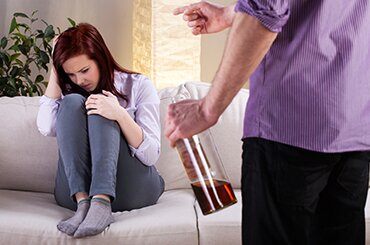Allan Schwartz, LCSW, Ph.D. was in private practice for more than thirty years. He is a Licensed Clinical Social Worker in the states
...Read More
Alcohol and Personality Changes?
Alcohol’s impact on personality can lead to profound changes in behavior, transforming mild manners into aggression and hostility. This complex issue intertwines with genetics, psychological health, and stress, making it crucial to address. For those facing the challenge of dealing with an altered loved one, ensuring personal safety and emotional well-being is paramount. Key steps include staying calm, avoiding confrontation, and seeking professional support, emphasizing the importance of safety and emotional health above all.
Reactions to Alcohol
It is important to state that individuals react differently to alcohol. There are people who become “happy drunks.” They are people whose aggression is not released when they are drinking, even if they may become more outgoing.
The way a person reacts to alcohol seems to depend on such things as their genetics, constitution, neurological system, and many other imponderable factors.
In contrast to those who are the happy drunks are those who become rageful when they are drinking. How quickly they become rageful also varies according to the same variable factors mentioned above. For some, rage can begin after one drink while for others, it may take many drinks. For those who experience this release of aggression after drinking the speed of the onset of their belligerence may depend on their recent mood and stress level.
The point that is being emphasized here is that for those people who become irritable while drinking it can seem as though a personality change or transformation has occurred to the loved ones surrounding this person. Of course, the transformation is not permanent and the previously inebriated individual returns to baseline after they recover from the drinking episode.
 Hear from others about their struggles with loved ones who change under the influence of alcohol.
Hear from others about their struggles with loved ones who change under the influence of alcohol.
In the recent months, we have received plenty of questions and comments about alcohol abuse. All of the posts mention feelings of shock about the way the writers have been treated by their spouse or significant other when they have been drinking. In many of the cases, writers ask if it is true that alcohol consumption can cause personality changes and if the rageful comments made by the inebriated individual can be true.
Therapists are Standing By to Treat Your Depression, Anxiety or Other Mental Health Needs
Explore Your Options Today
Ad
Recognizing Signs of Alcohol-Induced Aggression
Alcohol-induced aggression can manifest in subtle shifts before escalating into more overt hostility. Recognizing these early warning signs is critical for intervening effectively and ensuring the safety of all involved. Below are key indicators to watch for:
- Changes in Speech: This can include slurred speech, an increase in volume, or a shift in tone that leans towards aggression or belligerence. Pay attention to how the content of conversations changes, such as more frequent criticisms or insults.
- Demeanor Changes: Look for alterations in body language, such as increased gesturing, pacing, or intruding into personal space, which can signal growing agitation. A previously relaxed individual may suddenly appear tense or on edge.
- Physical Cues: Noticeable signs include flushed skin, bloodshot eyes, or a change in breathing patterns. Physical restlessness or the inability to sit still can also precede aggression.
By identifying these signs promptly, it becomes possible to implement intervention strategies and safety planning before situations escalate. Early recognition empowers individuals to seek help, whether it’s contacting professionals, removing oneself from a potentially dangerous environment, or engaging in de-escalation techniques. Ultimately, understanding and acting upon these early warnings are vital steps toward protecting oneself and loved ones from the adverse effects of alcohol-induced aggression.
How to Deal With an Angry Drunk Spouse
When an alcoholic spouse is inebriated, it can be both emotionally and physically overwhelming. Alcoholism is a serious illness, and it’s essential to remember that even when your partner is acting out in anger or aggression. It can be difficult to handle a situation like this, but with patience, understanding, and help from professionals, you can learn how to deal with an angry drunk spouse.
The first step in dealing with alcohol abuse is to stay calm and avoid any kind of physical confrontation. No matter how angry or frustrated you may be, it’s never okay to respond to aggression with violence or threats. It’s also important to remember that your spouse is in the grip of a serious illness, and it’s not their fault that they are behaving the way they are.
Alcohol addiction is a medical condition, and professional help should be sought to address the underlying issues. Your spouse may need addiction treatment, therapy for any emotional or mental health problems, and support from family and friends. The right combination of treatments can help your partner manage their drinking problem and learn how to cope with their emotions without resorting to alcohol.
It’s also important to remember that it’s not your job to “fix” your spouse. You can be supportive and offer understanding, but ultimately, the decision to seek help is up to them. If they are unwilling or unable to get help, it may be necessary for you to seek support from family and friends, or professional counseling (online therapy can be a great option).
Remember that alcoholism is a lifelong battle, and it’s important to have realistic expectations. Recovery will take time and effort and may be accompanied by setbacks along the way. It’s important to be patient with your spouse as they work towards sobriety, while also taking care of yourself. There are many resources available to help you cope with the situation, so don’t hesitate to reach out for help.
The Bottom line
In my opinion, things said by a drunk while they are drunk, should not be taken seriously.
-
For those individuals, the release of aggression is so powerful, after they have started drinking, that their comments and behavior are irrational. I am aware of the ancient Roman saying that “In vino veriatas.” I do not agree that what is said while drinking is truth.
If you suspect or even question if you have a drinking problem it is important to go for help. Among the types of help available are: Alcoholics Anonymous, Rational Recovery, Detox and additional treatment programs and now there is even medication that, after recovery, can remove the impulse or craving to drink.
What are your comments about this important issue?
Allan N. Schwartz, PhD
Keep Reading By Author Allan Schwartz, LCSW, Ph.D.
Read In Order Of Posting
Additional Alcohol Articles
- Alcoholism History
- Effects of Alcoholism on Mental Health
- Alcoholism and Verbal Abuse

